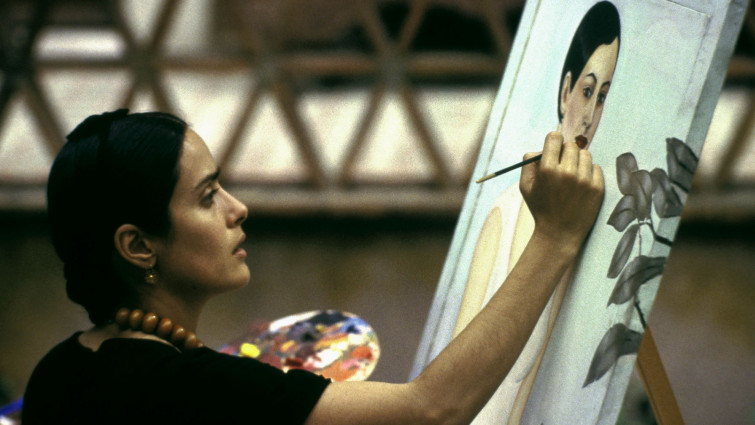

Member review

Frida
Salma Hayek stars in this biopic of the groundbreaking Mexican-born artist Frida Kahlo
Certificate
Duration118 mins
Review by
- adrian, 26
- 1 reviews
Paint Till You Die
Director Julie Taymor triumphs with this biopic of the influential surrealist Mexican painter Frida Kahlo.
Following a tragic bus accident that nearly rendered her paraplegic, Frida, portrayed by Salma Hayek, develops her painting skills, leading her to a friendship with her future husband, the free spirited painter and communist activist Diego Rivera, portrayed by Alfred Molina.
The story starts in 1920s Mexico and expands throughout the following decades as the couple’s relationship gets explored, showcasing their team spirit and struggles.
More than often, Diego’s unfaithfulness leads to arguments which take their toll on Frida’s sanity, leading her to binge drinking and depression.
Intense, bright colours are associated with the happier moments and show Mexico as a chromatic country as some of its beauty is brought over by the couple into the crowded and restless city of New York. I felt that the Mexico setting worked the best thanks to the country’s amazing landscapes and views.
Short animation clips inspired by the mexican holiday “Day of the Dead” improve the transitions between phases of Frida’s life. Although this is a rather morbid aspect, it is also what makes it unique.
The slow pace of the movie leads to rather dull scenes that sometimes feel they only exist in order to fill in the gaps between the key moments. Antonio Banderas (Siqueiros) , although a great addition to the cast, barely gets five minutes of on-screen time and it left me thinking he should’ve been given a bigger role. This is followed by two other cameos by Edward Norton (Rockefeller) and Geoffrey Rush who plays a charming soviet politician on the run, Leon Trotsky.
Secondary cast felt so undeveloped, I started questioning the reasons behind some of the characters’ decisions.
The focus on Frida’s artistic skills and development gets sometimes overshadowed in favour of romantic scenes.
Camera work is decent and works great inside the artists’ studios, the angles showcasing the chaotic work areas. The Dialogue was well written, major highlights being the one-liners the main characters have. The soundtrack is one of the best features as the traditional mexican music goes hand in hand with the setting and it adds to its approach to realism.
“Frida” feels more than just a biopic at times. It is the journey of a strong woman who manages to overcome the struggles of life and achieves great things over the three decades the movie spans on.
While not the masterpiece one might expect, it is a bold attempt at trying to please not just those interested in Frida’s paintings, but also those looking for a compelling life story.